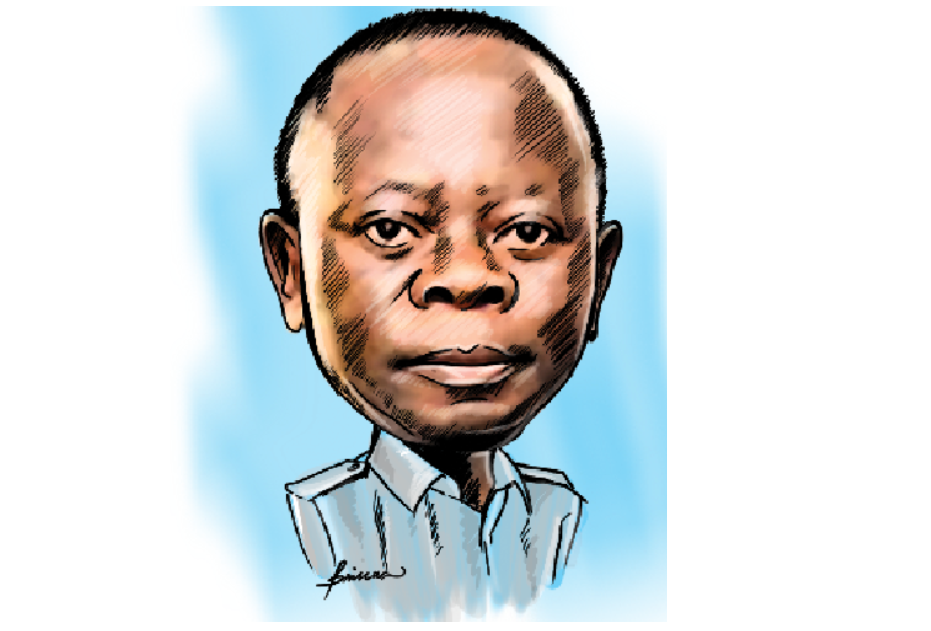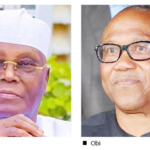Claim
A former governor of Edo State, Adams Oshiomhole, recently claimed that the Labour Party’s presidential candidate, Peter Obi, should be held responsible for the high unemployment rate in the country. He justified his claim with the fact that Obi imports foreign products into the country to sell at his luxurious mall located in Abuja.
Verdict
The claim is misleading. Even though Peter Obi imports foreign goods into the country to sell, which can affect job creation, that is not the critical factor hindering creation of jobs as the country does not have infrastructures and policies that would engender manufacturing industries to produce goods locally.
Full text
A former governor of Edo State, Adams Oshiomhole, said Peter Obi is contributing to Nigeria’s unemployment by importing finished goods.
Speaking during the flag-off of his campaign in the Auchi area of Edo State last week, the All Progressives Congress (APC) senatorial candidate for Edo North, said “Obi owns the biggest shopping mall in Abuja and all the items sold there are imported.”
Quality of education in Nigeria: The promises of a bleak future
The aftermath of Borno insurgency lessons
“If he is selling imported wines, clothes and other items, he is contributing to why Nigeria is going down because he is creating jobs abroad and importing unemployment to Nigeria.”
Background
With the campaign to occupy political positions in top gear, politicians in the country would devise ways to discredit their opponents.
The popularity of Peter Obi, a former governor, has been on the rise since he declared his intentions to run for the country’s presidency.
His supporters have been vocal on social media and their campaign can be felt on the streets as more Nigerians are dissatisfied with the crop of current political leaders.
His core supporters have been the youth among which the National Bureau of Statistics (NBS) stated that 42.5 per cent are unemployed as of 2020.
How Nigeria’s unemployment has increased
Nigeria’s unemployment rate has been burgeoning over the years as its economy battles with inflation, which has seen to the increase in cost of living and weakening of the naira.
These indices, which have greatly affected manufacturing companies as they struggle to stay above waters with the sinking economy, have affected staff strength as it would cost more to produce, hence, the need to lay off staff. Those that can’t withstand the shock of the economy have shut down, with hundreds or thousands of jobs following suit.
The situation has been compounded by the country going into recession twice in five years.
According to data sourced from NBS, unemployment rate has been on a steady rise since the first quarter of 2015.
The bureau had stated that unemployment rate as at Q4 2014 was 6.2 per cent but rose to 7.54 per cent in Q1 2015. It further stretched to 8.19 per cent in Q2 2015, then moved to 9.9 per cent in Q3 2015 and 10.44 per cent in Q4 2015.
In 2016, it moved to 12.09 in Q1, then 13.32 per cent in Q2, rose to 13.88 per cent in Q3 2016 and end the year with 14.23 per cent in Q4.
In Q1 2017, unemployment rate rose to 14.44 per cent, moved to 16.18 per cent in Q2, rose to 18.8 per cent in Q3 and 21.83 in Q4. In the first quarter of 2018, Nigeria’s unemployment rate was 21.8 per cent. In Q2, it was 22.73 per cent and 23.13 per cent in Q3.
The unemployment rate for Q2 2020 was 27.1 per cent and 33.28 per cent in Q4 2020.
Nigeria’s economy has over the years depended on oil revenue which has brought in foreign exchange that has propped up the naira.
But with the price crashing in 2020 due to COVID-19, and Forex getting scarce, many people only have access to foreign currency through unofficial sources.
Verification
Checks by Daily Trust Saturday showed that Next Cash and Carry, located in Abuja, is owned by Peter Obi.
The mall is not currently in operation due to the inferno that consumed the building last year. Sitting on a total site area of 34,000sq metres, with a sales floor of 10,000sq metres; 400 parking bays, 1200sq metres of Goods Receiving areas, 600 non-food & 250 food trolleys and three 810kva back-up generators, it is truly the largest shopping mall in Abuja.
Were all products sold in the mall imported?
The General Manager of Next Cash and Carry Ltd., Mr. Neil Pape, had in an interview said the stock sold in the mall include food and non-food storage including edible groceries, non-edible groceries, health and beauty aids, soft drinks, commodities and bulk food for non food.
“We have clothing, footwear, sports, housewares, kitchenware, small appliances, audio, cellular, outdoor and toys. Others are lighting, brush ware, large appliances, office and stationery, hi tech, multi-media, DIY, textiles, lighting, plastic ware and luggage. Our other range of stocks is in the area of multi-media, audio and cellular products and services. Yet others include liquor (beer, spirits and wine), butchery, bakery, deli/chilled area, coffee bar/restaurant, ice cream bar and pharmacy.”
While indicating that the mall has arrays of imported products, Pape, however, noted that it believes in supporting local industries, especially farmers.
He said the company has “already been working with local farmers on the supply of poultry and for food and vegetables. So, everything you see in the store at the moment are sourced locally through agents.” “These are the range we have struggled to get and we may have to import more to satisfy the 32 market segments.”
But before the mall stopped working, the general manager stated that it had a staff strength of about 1000 direct and indirect staff and over 3000 vendors, with 200 farmers supplying items to the store. This is apart other employees on its payroll in Lagos and Port Harcourt malls.
Should importation be blamed for loss of jobs in the country?
There is no gainsaying that overdependence on importation of finished products affects availability of jobs in a country, but the economic stability and government policies have a large role to play to make that a reality.
For Nigeria, having the necessary infrastructures for businesses to strive has been a major challenge.
For instance, farmers need to move their goods to markets. The routes that link the farms to the cities are in poor shape.
Similarly, power supply is erratic which led manufacturers in the country to spend N81.91bn in 2020 and N61.38bn in 2019, according to the Manufacturers Association of Nigeria (MAN).
In the same vein, a report by MAN titled ‘Manufacturer’s CEOs Confidence Index (MCCI) said majority of MAN CEOs interviewed (89 percent) agreed that multiple taxes and levies depress production in the manufacturing sector.
“Record shows that manufacturers pay over 30 different taxes, levies, and fees to Agencies of the Federal, State and Local Governments on account of increased revenue target.”
Accessibility to Forex has also been a major challenge leading MAN to ask the Central Bank of Naira (CBN) to allocate more foreign exchange to ease the importation of raw materials and machinery.
Speaking at the 36th annual general meeting in Benin, the chairman of MAN, Edo and Delta zones, Okwara Udensi, said the sector needs an urgent bailout from the federal government to prevent total collapse as the persistent shortage in dollars was affecting the manufacturing sector negatively.
“Manufacturing companies are unable to access the dollar at the official rates and they need it for the importation of raw materials,” he said.
“They have, consequently, to go to the parallel market to get the dollar at higher rates.
“The sector is facing numerous challenges and it needs the urgent attention of the federal government to provide an adequate bailout for the sector to avoid total collapse.”
Security is another challenge which has led the country struggling to attract Foreign Direct Investment. Foreign investments into Nigeria has declined by 81.46 per cent ($6.91bn) from $8.49bn in the first quarter of 2019 to $1.57bn in the corresponding quarter of 2022.
According to the bureau, since the first quarters of 2019, 2020, 2021, and 2022, there has been a steady decline in capital inflows into the nation’s economy.
But to get out from the problems, Udensi noted that government should be consistent with its policies to guarantee the required enabling environment so that manufacturing companies are able to operate at maximum capacity.

 Join Daily Trust WhatsApp Community For Quick Access To News and Happenings Around You.
Join Daily Trust WhatsApp Community For Quick Access To News and Happenings Around You.


